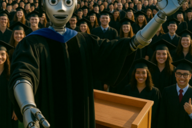You have /5 articles left.
Sign up for a free account or log in.
"There must be many who, as I do, remember those moments spent with books at times of holiday that now are hidden beneath successive memories of all those other times, so quiet, so undisturbed, which made a sanctuary for reading."
--Proust, Ruskin and Others
At one point in René Clémente's classic French film Forbidden Games, the daughter of the French peasant family is sitting at a wooden table, reading a book. "What is it?" her father asks. "I don't know but it's good." A few minutes later he snatches the candle away and snarls, "light isn't made for reading." Then he blows out the candle. I suspect that most of us would protest: "No! Light is made for reading." We academics are who we are -- whatever our discipline -- because we read.
We read everywhere -- in every room in the house, under trees in our yards, in our offices, over in the library. Waiting for the dentist, we read. Taking a train or a plane, we have a magazine or a book in hand. (Or perhaps an audio book on our ears while driving.) I used to know a widely published critic who wrote while watching pro football on TV. His wife would joke about the spectacle of seeing him sitting before the set, books spread out all round him on a desk.
Lately, however, it's seemed to me that the place of reading has become harder to establish. The ubiquitous video screens -- in our dentist's offices and our airplanes as well as our homes -- represent the problem. Why read when you can look? To read a book has always been a choice. Just literally reading anywhere, it has always been possible to look up from the page. The video screens, however, substitute another source of visual attention that makes it unusually difficult to look down at the page.
Of course it remains possible to integrate the act of reading into just about any activity. Best, though, to enjoy the act quietly, undistracted, and alone. Where is this place to be found? For academics, the answer has been easy: lots of places, including the library, student union, or even at special groves or grottos -- not to mention your office. The whole of a college or university campus, in fact (except perhaps the parking lots) can be defined as a location designed to enable reading. It's not just reader-friendly. It's reader-constitutive.
As an undergraduate, I used to read regularly at night with a few friends in a room on the bottom floor of the administration building. Although the room had tables and couches, it wasn't authorized for students, which made it especially sweet for a few of us (one had a key to the building) to occupy, especially during all-nighters before tests. It was as if our privacy had been won out of public space. Probably it would be fairer to say that public space, already permeable, had been simply stretched a bit more to include us as readers.
That same space may or may not be more crowded now. That student sprawled on the grass, head bent as if in prayer, reading beneath a leafy tree? He or she is surely not exclusively a front-cover fantasy of admissions brochures or college catalogues. That student still exists, or rather the spaces necessary to be that student. And yet it seems to me he or she will more likely be shown today in a lab or a classroom -- places where the individual act of reading has been, well, taken for granted.
A place to read? How many students come to scholastic grief because they never find one? Last year the daughter of a friend flunked out of a huge state university because, she claimed, she could never actually read anywhere. The dorm room? Her roommates were all fun and games. The library? Far too noisy. In effect, the girl fell victim to the energies of a text-messaged, i-Poded and above all cell-phoned American culture. The point of this culture is linkage, not detachment. What is required is the formation of various communities, not of some distinctive individual identity.
A book might be all very well. But what really matters is access, and for access -- to chat rooms or home pages much less Web sites -- you have to have a computer. All sorts of places are provided where you can boot up and log on. The whole imagination of colleges and universities today has to do with Wi-fi rather than reading. Computer activity is public. By contrast, the activity of reading has never seemed more private. Granted, there are dorm study areas and student union reading rooms. But the atmosphere at just about any computer lab will be more concentrated -- if frequently no more silent--and nobody goes to one of these to read a mere book. A computer can provide instant access (that word again) to thousands of books, not to say, it seems, to Knowledge itself.
In a very real sense, the sheer fact of place never leaves the reader. A while ago in The New York Times Book Review, Francine Prose began a review by reflecting on how the moment we discover a favorite writer is inseparable from he memory of where we were and what we were doing. Thus, she recalls the steamy subway car when she first read Isaac Babel or the summer picnic table at which she first read Kafka. Just so, I think, places to read matter, even if some reading becomes so intense that it succeeds in transfiguring a place -- just about any place.
How precisely does place matter? It's very hard to say. Never mind the institutionally designated reading places, such as they remain. More important may be the private, secret ones that await discovery all over campus by any individual. Such a place, I believe, was the one I enjoyed as an undergraduate in the administration building. And such a place was the office an old colleague of mine once told me about, during his time as interim dean. "I'd just close the door, tell my secretary I was not to be disturbed, and then read."
He loved to linger over his hours in the dean's office. (No wonder he only lasted one year in the position!) They represented, he said, the happiest reading of his life. Could the corresponding happy reading hours for each of us be in some way contrary? That is, we're not supposed to be reading where we are or else we're supposed to be doing something else there rather than reading. Yet we persist. The very act of reading, it is often claimed, is not a social one. If so, during these contrary times, reading becomes actively antisocial.
Perhaps this is why when I think of my own happiest reading, the most vivid moment is during the semester I taught War and Peace. There was no other text in one class that semester; the novel was parceled out over 14 weeks. Each Sunday morning I went to my office and did the week's reading. Nobody was ever in the building. When did I become aware, though, that it wasn't the silence I cherished so much as the very day? Having chosen the great book as already a form of worship, it was as if I then proceeded to read it on society's day of worship, albeit only for my own pleasure.
Of course I was fortunate enough to have a place to read: my office. As readers, professors differ from students because they already have personal places of their own. Whether faculty (not to say administrators) take their offices to be wholly private is of course another matter. My narrow point is simply that an office represents the space for something quiet and secluded -- precisely the qualities associated with the ideal site of reading. I remember my first office because it was where I could close the door, office hours be damned, and read Dante or Stendhal -- undisturbed.
Today upwards of half of higher education's teaching is done by adjuncts. Where do they read? At home. Where else can they read? On campus, some might share an office with other adjuncts; almost by definition, none has an individual office. The degraded status of adjuncts is nowhere better seen than in the failure of their
institutions to provide them with places to read.
Instead, adjuncts compete with students for precious space in student unions or libraries, where they do not correct composition papers on tables in the department lounge or grade examinations on student desks temporarily set along the corridors of classroom buildings. I knew an adjunct who boasted she could "knock off" half a set of compositions in the bathroom." At least it's for faculty." Of course this sort of reading is so sponsored by necessity as to seem like another activity altogether from lounging around somewhere, with a book in hand that isn't on a course syllabus. So it may be.
Yet the problems of finding a place to read apply to everybody, and embrace every sort of reading. If you ask people who don't read why they don't, the most common reply will be, they "don't have time." I suspect a more acute reply would be, they haven't found a place. The right place will reveal the time, not to say Time in some Proustian sense, during which it scarcely matters what you're reading.
At any rate, let us leave full-time faculty in their offices, doing whatever it is they do there. (At present, probably more e-mail than anything else.) With part-time faculty, we return to the condition of students, whereby, once more, reading has been taken for granted. Somehow, places will be found so that it can be accomplished. Our confidence that it will must be affirmed. Take the last "Education Life" supplement of the Sunday New York Times with a feature on Southern private liberal arts colleges. There's a comforting picture of two Davidson students -- one sitting, one lying -- atop a stone fence along a hall porch. They're reading. Not computer screens. Actual books.
The picture looks posed. But so what? We are consoled. Here at least are two students (if not one photographer) who have found real places to read. The institution looks upon them with favor. Indeed, with white Georgian columns and lush green lawns spread out in front of the students, the institution can afford to appear before many other institutions with the force of a rebuke: here, the picture seems to declare, is college education in its ideal form. And how better to represent this form other than by picturing students reading? This particular college is so lavishly appointed that it not only encourages reading but provides casual spaces for it to take place.
Cynicism or resentment be still! Would that such spaces were everywhere so! As academics, we must try to remain confident that readers anywhere -- even in colleges everywhere where the act of reading is effectively disdained -- will find places to read. No matter that these are probably more difficult to find now than ever before. Unlike light, college is made for reading. We won't learn anything if we can't find a place to read.




